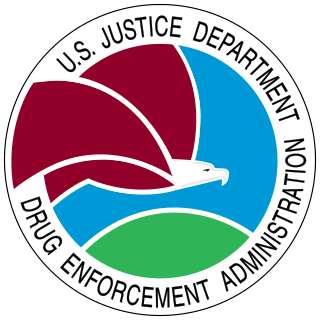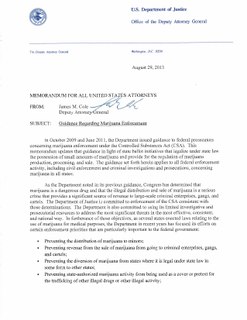
The Drug Enforcement Administration (DEA) is a United States federal law enforcement agency under the United States Department of Justice, tasked with combating drug smuggling and distribution within the United States. The DEA is the lead agency for domestic enforcement of the Controlled Substances Act, sharing concurrent jurisdiction with the Federal Bureau of Investigation (FBI), Immigration and Customs Enforcement (ICE), U.S. Customs and Border Protection (CBP), and the Department of Homeland Security (DHS). It has sole responsibility for coordinating and pursuing US drug investigations both domestic and abroad.

The Marijuana Policy Project (MPP) is the largest organization working solely on marijuana policy reform in the United States in terms of its budget, number of members, and staff. Its stated aims are to: (1) increase public support for non-punitive, non-coercive marijuana policies; (2) identify and activate supporters of non-punitive, non-coercive marijuana policies; (3) change state laws to reduce or eliminate penalties for the medical and non-medical use of marijuana; and (4) gain influence in Congress. MPP advocates taxing and regulating the possession and sale of marijuana in a manner similar to alcohol, envisions a nation where marijuana education is honest and realistic, and believes treatment for problem marijuana users should be non-coercive and geared toward reducing harm.

Robert Cleve Bonner is an American former prosecutor, former United States District Judge, former Administrator of the Drug Enforcement Administration and former Commissioner of United States Customs and Border Protection. He is a member of the Board of Trustees of the California Institute of Technology, a retired partner at the law firm Gibson, Dunn & Crutcher and former Chair of the California Commission on Judicial Performance.

The Oregon Liquor and Cannabis Commission (OLCC) is a government agency of the U.S. state of Oregon. The OLCC was created by an act of the Oregon Legislative Assembly in 1933, days after the repeal of prohibition, as a means of providing control over the distribution, sales and consumption of alcoholic beverages. To this end, the agency was given the authority to regulate and license those who manufacture, sell or serve alcohol. Oregon is one of 18 alcoholic beverage control states that directly control the sales of alcoholic beverages in the United States. In 2014, the passage of Oregon Ballot Measure 91 (2014) legalized the recreational use of marijuana in Oregon and gave regulatory authority to the OLCC.

Since the 1970s, the college town of Ann Arbor, Michigan has enacted some of the most lenient laws on marijuana possession in the United States. These include measures approved in a 1972 city-council ordinance, a 1974 voter referendum making possession of small amounts of the substance merely a civil infraction subject to a small fine, and a 2004 referendum on the use of medical marijuana. Since state law takes precedence over municipal law, the far-stricter state marijuana laws are still enforced on University of Michigan property.
Amendment 44 was a proposed amendment to the state statutes submitted for referendum in the 2006 general elections in the U.S. state of Colorado. The amendment proposed the legalization of the possession of one ounce or less of marijuana for any person twenty-one years of age and over, as long as marijuana use does not occur in public. The measure was eventually defeated at the polls by 60-40 percent.

In the United States, the non-medical use of cannabis is decriminalized in 14 states, and legalized in another 10 states, as of April 2019. Decriminalization refers to a policy of reduced penalties for cannabis offenses, typically involving a civil penalty for possession of small amounts, instead of criminal prosecution or the threat of arrest. In jurisdictions without any penalties the policy is referred to as legalization, although the term decriminalization is sometimes broadly used for this purpose as well.

The legal history of cannabis in the United States pertains to the regulation of cannabis for medical, recreational, and industrial purposes in the United States. Increased restrictions and labeling of cannabis as a poison began in many states from 1906 onward, and outright prohibitions began in the 1920s. By the mid-1930s cannabis was regulated as a drug in every state, including 35 states that adopted the Uniform State Narcotic Drug Act. The first national regulation was the Marihuana Tax Act of 1937.

Cannabis in Oregon relates to a number of legislative, legal, and cultural events surrounding use of cannabis. Oregon was the first U.S. state to decriminalize the possession of small amounts of cannabis, and among the first to authorize its use for medical purposes. An attempt to recriminalize possession of small amounts of cannabis was turned down by Oregon voters in 1997.

Cannabis in California is legal for both medical and recreational use. In recent decades, the state has been at the forefront of efforts to reform cannabis laws, beginning in 1972 with the nation's first ballot initiative attempting to legalize cannabis. Although Proposition 19 was unsuccessful, California would later become the first state to legalize medical cannabis with the passage of the Compassionate Use Act of 1996. In November 2016, California voters approved the Adult Use of Marijuana Act to legalize the recreational use of cannabis.
Wo/Men's Alliance for Medical Marijuana (WAMM) is a not for profit medicinal cannabis dispensing collective located in Santa Cruz, California. WAMM was founded in 1993 by Valerie Leveroni Corral and her then husband Michael Corral. Members receive organic medicinal cannabis at cost and volunteers trade work for cannabis. There is a compassion program for those unable to afford the full cost of medicine. WAMM is the first medical marijuana collective to receive non-profit status from the United States Government.

In the United States, the use and possession of cannabis is illegal under federal law for any purpose, by way of the Controlled Substances Act of 1970. Under the CSA, cannabis is classified as a Schedule I substance, determined to have a high potential for abuse and no accepted medical use – thereby prohibiting even medical use of the drug. At the state level, however, policies regarding the medical and recreational use of cannabis vary greatly, and in many states conflict significantly with federal law.

The legal history of cannabis in the United States began with state-level prohibition in the early 20th century, with the first major federal limitations occurring in 1937. Starting with Oregon in 1973, individual states began to liberalize cannabis laws through decriminalization. In 1996, California became the first state to legalize medical cannabis, sparking a trend that spread to a majority of states by 2016. In 2012, Colorado and Washington became the first states to legalize cannabis for recreational use.

The Ending Federal Marijuana Prohibition Act is a series of federal marijuana decriminalization bills that have been introduced multiple times in the United States Congress.
Cannabis in Iowa state refers to medical cannabis in Iowa. Only cannabidiol (CBD) and 3% or less of delta-9-tetrahydrocannabinol(THC) oil are legal from licensed dispensaries in the state.
Cannabis in Arkansas was outlawed in 1923, and possession of small amounts remains a misdemeanor crime. Medical use was legalized through a 2016 ballot initiative, however.

Project Southern Tempest was a major U.S. Immigration and Customs Enforcement (ICE) operation conducted between December 2010 and February 2011 targeting transnational street gang members with ties to drug cartels in Mexico, as part of the ongoing law enforcement initiative known as Operation Community Shield.
Cannabis in New Mexico is illegal for recreational use, but decriminalization goes into effect in July 2019. A bill to legalize recreational use passed the House in March 2019.

The Cole Memorandum was a United States Department of Justice memorandum issued August 29, 2013, by United States Deputy Attorney General James M. Cole during the presidency of Barack Obama. The memorandum, sent to all United States Attorneys, governed federal prosecution of offenses related to marijuana. The memo stated that given its limited resources, the Justice Department would not enforce federal marijuana prohibition in states that "legalized marijuana in some form and ... implemented strong and effective regulatory and enforcement systems to control the cultivation, distribution, sale, and possession of marijuana," except where a lack of federal enforcement would undermine federal priorities.












